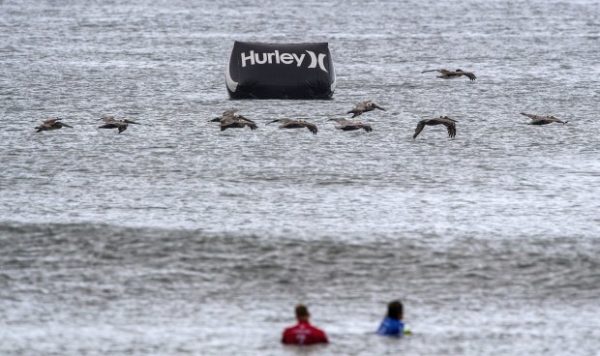
In the latest shake-up in the surf industry, the new owner of Hurley has detailed its long-term plan for the Costa Mesa-based brand, and in a statement explained the reasoning behind cutting 56 jobs since taking over in October.
Bluestar Alliance LLC, which bought Hurley from Nike, wants to expand the surfwear brand into a broader action-sports and lifestyle company, reaching beyond the beach and into areas including snow, skate, music and art.
The decision to eliminate the jobs was made in order to implement a sustainable plan for long-term growth, Bluestar CEO Joseph Gabbay said in a news release.
“We could not continue to replicate the prior model, but that does not mean we don’t respect the brand, its culture or the people that have helped build it. No one wants to have to make these difficult decisions, but they were necessary if Hurley was to go forward.”
The surfwear brand was created by Huntington Beach native Bob Hurley, who started his career as a boardmaker in the 1980s.
Hurley first found surfwear success after obtaining the North America rights for the Australian company Billabong, which he and partners brought to the U.S. and grew into a $100 million business with more than 150 employees.
In 1999, after 16 years running Billabong North America, he launched his own brand, Hurley International.
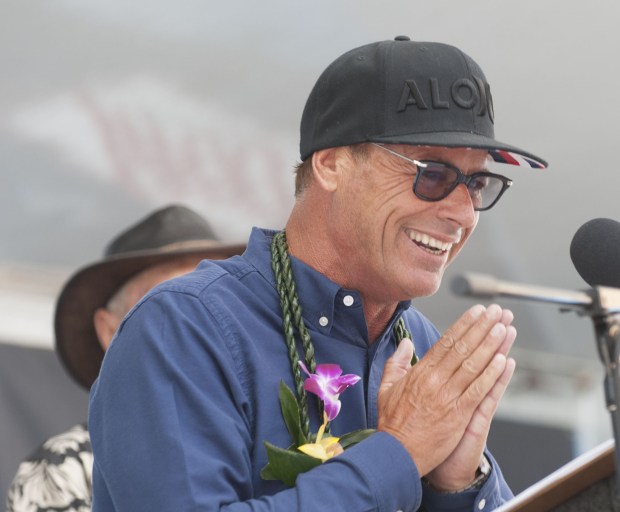
Hurley created the brand to be edgier than the more mainstream surf brands, gaining popularity partly through connections to the music scene, with groups such as Blink-182.
In a text Friday, Jan. 7, Hurley said he and his family are no longer involved with the company or the brand.
“I’ve read a lot of things about what’s happening with the people and the athletes. The employees and athletes delivered magic … made the brand what it was,” he wrote. “If what we are hearing is true, makes me sad.”
The brand changed ownership in 2002 with Hurley selling the company to Nike, which was attempting to dip its toe into the surf world.
After the purchase, the sports giant launched Nike Surfing, an apparel line focused on men’s boardshorts, T-shirts, hoodies and sweatshirts, and created Nike 6.0, the umbrella name for Nike’s action sports divisions, Hurley and Converse.
Nike started pulling back its surf involvement in 2012, funneling all the surf activity back into Hurley.
In 2019, Nike sold Hurley to Bluestar Alliance, which specializes in licensing out brands. Bluestar is the parent company of such brands as Bebe, Tahari, Brookstone and Limited Too.
One of the main goals for Bluestar is “changing the trajectory of our overall surf business” and expanding the focus beyond surf into skate, snow, music and art,” Ralph Gindi, chief operating officer, said in a statement.
While the business transitioned quickly to the new model, the new owners said they want to keep the brand heritage and authenticity, the statement reads.
Already, Hurley has entered into a licensing partnership with United Legwear & Apparel Co. for men’s apparel, underwear, legwear and flip-flops. Hybrid Apparel will focus on the women’s apparel business.
Hurley, the company said, will maintain a presence in Costa Mesa, where its headquarters is located.
Sign up for our Coast Lines newsletter, a weekly digest of news and features on how the residents of the SoCal coast are building ties to their changing environment. Subscribe here.
“Costa Mesa is the hub of our surf design and development, and will still employ 90+ people in design, production and sales, primarily based in the current corporate headquarters,” Gabbay was in the statement. “It will also remain the cultural center for the brand as we look to reintroduce on-campus events and initiatives.”
Hurley’s retail operations – with an estimated 320 full- and part-time employees — will remain intact, he said.
Aaron Pai, who owns Huntington Surf & Sport, which has a Hurley shop inside the store, said he’s seen a lot of ups and downs in the surf industry. The latest sale reminds him of what Billabong – which recovered from bankruptcy and is now under the Boardriders umbrella – was able to do.
“Now look at Billabong, they are on fire, they are doing super good,” Pai said. “We look at rebirths like that as possible, renewing the brand is possible and relating that to Hurley in 2020 is a definite possibility in the future.”
Hurley also has seen significant changes with its sponsored surf team and veteran ambassadors. Longtime surf team rider Rob Machado put out a statement on social media about a month ago, saying he and Hurley had parted ways.
“All good things must come to an end,” Machado wrote, reflecting on how 20 years ago Bob Hurley told him “go surf.”
“He could see my frustrations with contest surfing and knew that I would be better off just surfing and being me. Thank you Bob for the years of encouragement, motivation, inspiration, enjoyment,” he wrote. “It truly has been an honor to work for the brand for such a long period of my life.”
Two-time world champion and USA Olympic team member John John Florence also cut ties with Hurley, reportedly walking away from a multimillion dollar contract that was said to be one of the largest in the sport of surfing, according to surf industry website Stab Magazine.
Athletes including San Clemente surfer and 2020 Olympian Kolohe Andino, along with Julian Wilson, Filipe Toledo, Kai Lenny and Koa Smith are still on the Hurley roster.
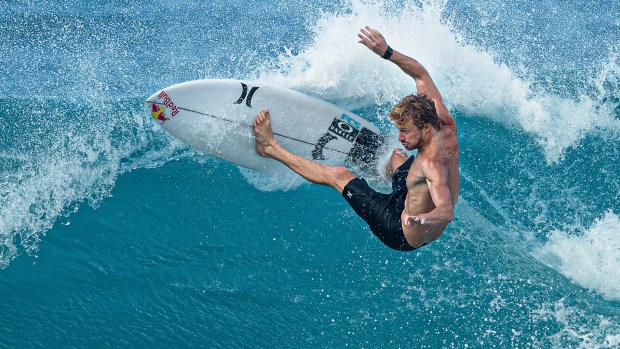
“We will continue to focus on major competitive sponsorships in surf but will be looking for other action sport initiatives,” said Gindi. “Tying in the right athletes, celebrities and influencers, in an inclusive way, is our goal. We want more, not less. There are several exciting deals in the works that we will announce over the coming weeks.”
Peter ‘PT” Townend, surfing’s first world champion who closely follows shifts in the surf world, notes that Hurley is just the latest surf brand facing changes with new ownership.
“I’ve never seen them come in and reconstruct the company to the degree they have,” he said of Hurley’s new owners.
The brand’s survival will come down to licensees, he said.
“If you get good licensees, you can make more money. That’s the bottom line,” Townend said, noting that Ocean Pacific, or OP, was one of the first to follow this model in the ’80s.
It’s yet to be seen if Hurley will be able to maintain the quality of its product, he said.
“I don’t think you’ll see an immediate effect, but the long term (question) is if they cheapen the product,” Townend said. “That’s sometimes a risk, they don’t stand up to the quality set by Hurley. It has always been on the cutting edge, Hurley was right at the forefront of that. If they don’t keep up to that standard, that can affect the brand.”
Re-focusing the brand beyond surf is much like what Hurley set out to do in the late ’90s, Townend noted, and the direction is not unlike that of the most successful action-sports lifestyle brand at the moment, Vans.
Pai, who offered Bob Hurley space in his surf shop when he started out as a shaper four decades ago, said he hopes it works out for the Hurley brand.
“We have a lot of friends with Hurley that are still powering and working long hours there,” Pai said. “We believe in Hurley — we have from the beginning. One thing about life, short term and long term, there’s always going to be change.”

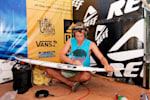

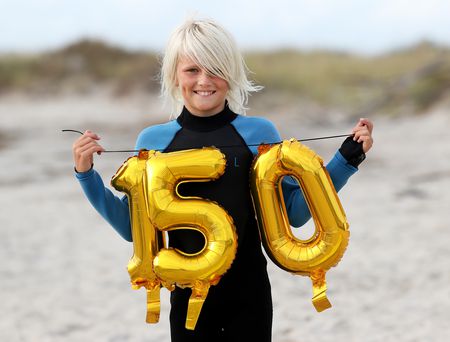

Recent Comments